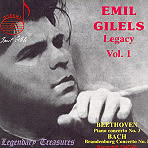Doremi continues to mine rare postwar Melodiya bounty, launching a series devoted to Emil Gilels. His 1947 Beethoven Third is the first of his six recorded versions. It differs little from the others as an interpretation, except that the Largo seems rather static and matter-of-fact next to the pianist’s rippling, meditative 1968 collaboration with George Szell for EMI. Kirill Kondrashin’s disciplined leadership, however, doesn’t compensate for a raw-sounding orchestra, and the cramped, strident sonics hold no attraction. By way of contrast, Gilels’ only recording of the Fifth Brandenburg has much to recommend it. The first movement cadenza dances with color and spark, while the pianist’s deft interplay with his sensitive colleagues transcends any quibbles concerning non-Bachian dynamic and expressive devices, of which there are plenty. While the grainy sonics aren’t especially balm to the ear, the performance easily stands alongside the great piano Fifth Brandenburgs by Rudolf Serkin, Alfred Cortot, and Lukas Foss.
































